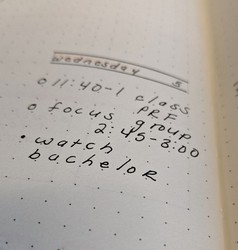Emotional stability is something that is hard to control—and if you lose it, it is hard to get back.
In the following weeks, students and professors alike will be struggling to keep themselves composed. It isn’t about how hard you fight to stay on top, or what other people want and need from you—it’s about taking the time to gather and pursue yourself.
Becoming emotionally healthy may be easy, but maintaining yourself is the hard part—especially during the semester.
First off, imagine sitting in a dimly lit room. Alone. No computer, no phone, and most importantly, no distractions.
Now, allow yourself to close your eyes and take some deep breaths. You feel the knots in your body and mind begin to unravel. You might be getting tired, and that’s okay. You might need some sleep. By allowing yourself to enter this place of tranquility, you are allowing your body to tell you what it needs and thus be able to act upon it.
In fact, this is exactly what Claude Taylor, Professor of Communication, recommends. He said, “Sitting still with no distractions for fifteen minutes or listening to house music are my two strategies for staying emotionally healthy during the course of the semester.”
Additionally, there is value in watching something that allows your brain to take a break without having to worry about the world around you.
Let’s consider this situation: It’s a Monday night. You and your friends are sitting on the floor, backs pressed against the couch, a box of pizza in front of you, and a glass of wine in hand. Talking, laughing, and enjoying a show. A show that provides you with an escape, where once a week you can let go of everything else and focus on yourself.
You don’t always have to be reading and studying—sometimes you have to take a minute just to do the mindless things. In fact, spending quality time with friends is a great way to spend some time away from stressful assignments and to realign your emotional health.
Emma Blair, a senior business student, shares her Monday night go-to. She said, “I like to watch The Bachelor…watching a mindless show where all I have to sit back and relax is a great way to keep my mind at peace.”
We are all guilty of procrastinating and hearing ourselves slip into excuses such as, “I’ll do this assignment later. It can wait. Other things are more important.”
We often reschedule the time we put aside for ourselves to help others, or get things done. Helping others is a great thing and can make you feel good, but it is also vital to allot time for yourself.
“Set time aside for yourself and stick to it,” said Erin Maloney, a graduate student studying educational counseling. Maloney said that prioritizing alone time is something people often forget to do.
Our to-do lists will always be never-ending, but time is limited. Making time for yourself to relax, get your nails done, go to the gym, or do something you enjoy is just as important as eating and drinking. It is something we often overlook,
Work is piled on students from day one, and professors have to grade these assignments. Papers are on desks, sprawled out on beds, taking over everyone’s computers and minds, and demanding everyone’s personal attention.
Stress is one of the many reason’s students struggle throughout the semester. Not only do the students stress, but also the professors.
Elizabeth Muller, a junior psychology student, offers advice, “Prioritizing is the best way to stay emotionally healthy.” Holding everything off until the last minute can cause your mind to go into overdrive. Much like a computer when it’s used too much, a brain needs to be restarted in order to work properly.
PHOTO TAKEN by Melissa Badamo




